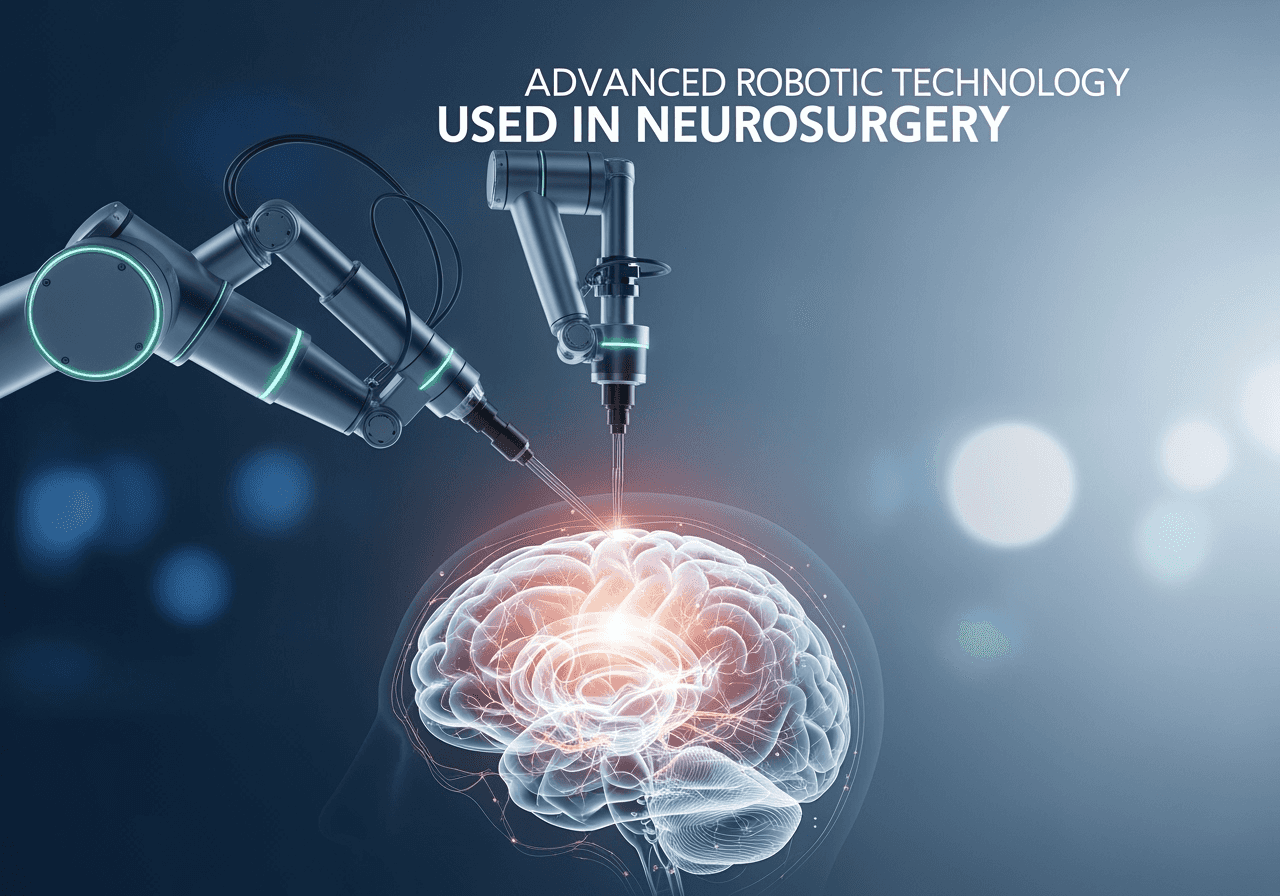
Advanced Robotic Technology Used in Neuro Surgery
30 Oct, 2025
 Healthtrip
HealthtripThe Rise of Robotics in Neurosurgery
Robotic technology is rapidly transforming neurosurgery, offering a new suite of tools that enhance a surgeon's capabilities. These robotic systems, equipped with high-definition 3D visualization, allow for a magnified and detailed view of the surgical site, crucial when operating on delicate neural structures. Imagine having a surgeon with enhanced vision and dexterity, able to manipulate instruments with incredible precision in spaces previously inaccessible. The robots' articulated arms mimic the surgeon's movements, but with greater accuracy and stability, minimizing the risk of tremors or unintended tissue damage. This translates to smaller incisions, reduced blood loss, and less post-operative pain for the patient. At Healthtrip, we connect you to hospitals like Fortis Memorial Research Institute, Gurgaon where such advanced technology is skillfully applied, ensuring you have the best possible chance for a successful outcome and a quicker return to your daily life. It's not just about the technology; it's about the skilled hands that wield it and the compassionate care that surrounds it.
Most popular procedures in India
Benefits for Patients
The benefits of robotic neurosurgery extend far beyond the operating room, significantly impacting the patient's overall experience and recovery. Minimally invasive techniques lead to smaller scars and reduced risk of infection, important for both physical and psychological well-being. Patients often experience less pain and require fewer pain medications after surgery, contributing to a more comfortable recovery period. Due to the precision of the robotic system, surrounding healthy tissue is spared, leading to a faster return to normal activities. This is particularly crucial for neurosurgery, where even a small amount of damage can have significant consequences. Healthtrip understands the importance of a smooth and speedy recovery and can connect you with hospitals offering minimally invasive robotic neurosurgery, such as Memorial Bahçelievler Hospital in Istanbul, ensuring you get back on your feet as quickly and safely as possible. We carefully select our partner hospitals to ensure they have the latest equipment and most experienced staff.
Specific Applications in Neurosurgery
Robotic neurosurgery is proving to be invaluable in treating a wide range of conditions, from brain tumors to spinal disorders. In brain surgery, robots can assist in the precise removal of tumors, even those located in difficult-to-reach areas, minimizing damage to surrounding healthy tissue. For spinal surgery, robotic systems can improve the accuracy of screw placement in spinal fusion procedures, leading to greater stability and reduced risk of complications. Moreover, robots are utilized in deep brain stimulation (DBS) procedures, where electrodes are implanted deep within the brain to treat movement disorders like Parkinson's disease – improving the precision of electrode placement can significantly enhance the effectiveness of the treatment. If you're exploring treatment options for any of these conditions, Healthtrip can connect you with specialists at leading facilities like NMC Specialty Hospital, Al Nahda, Dubai who are experts in robotic neurosurgery, providing you with personalized care and the latest treatment options.
Wellness Treatments
Give yourself the time to relax
Lowest Prices Guaranteed!

Lowest Prices Guaranteed!
Navigating Your Options with Healthtrip
Choosing the right neurosurgical treatment and finding the best hospital can feel like navigating a maze. That's where Healthtrip steps in to guide you. We provide comprehensive information about robotic neurosurgery and its applications, empowering you to make informed decisions about your health. Our platform connects you with world-class hospitals and experienced neurosurgeons, such as those at Vejthani Hospital in Bangkok, offering cutting-edge robotic technology. We understand that medical travel can be stressful, so we offer end-to-end support, from arranging consultations and travel logistics to providing post-operative care and follow-up. Think of us as your personal healthcare concierge, dedicated to ensuring a seamless and stress-free experience. With Healthtrip, you can focus on what matters most: your health and well-being.
Where is Robotic Neurosurgery Available?
The landscape of robotic neurosurgery is ever-evolving, with pioneering institutions around the globe embracing this cutting-edge technology. Access to robotic neurosurgery isn't uniform; it often depends on factors such as hospital infrastructure, surgeon expertise, and regional healthcare priorities. However, several countries have emerged as leaders in this field, offering patients advanced treatment options for complex neurological conditions. In Europe, hospitals such as Helios Klinikum Erfurt and Helios Emil von Behring in Germany, and Quironsalud Hospital Toledo and Jiménez Díaz Foundation University Hospital in Spain are increasingly incorporating robotic systems into their neurosurgical departments. These facilities often benefit from strong research programs and established surgical training platforms, making them attractive destinations for patients seeking innovative treatments. Moving eastward, Turkey is home to several hospitals with advanced neurosurgical capabilities, including Memorial Sisli Hospital and LIV Hospital, Istanbul, which are known for their adoption of minimally invasive techniques, including robotic surgery. These hospitals cater to a diverse patient population, drawing individuals from across Europe, Asia, and the Middle East. In the Middle East itself, Saudi German Hospital Cairo, Egypt and NMC Specialty Hospital in Dubai, UAE, are improving their technology and now offer robotic neurosurgery, giving more people access to cutting-edge healthcare in the region. The growth of robotic neurosurgery here shows how the area is dedicated to giving its patients the best and most advanced medical care possible.
The Asia-Pacific region is also showcasing impressive growth in robotic neurosurgery. Hospitals like Vejthani Hospital and Bangkok Hospital in Thailand, Mount Elizabeth Hospital and Singapore General Hospital in Singapore, and Fortis Memorial Research Institute in Gurgaon, India are leading the way. These institutions often participate in international collaborations, sharing knowledge and best practices to refine surgical techniques and improve patient outcomes. In the United States, robotic neurosurgery has become increasingly integrated into mainstream practice, with numerous academic medical centers and specialized neurosurgical clinics offering robotic-assisted procedures. Healthtrip understands that navigating the global healthcare landscape can be overwhelming. We want to connect you with the best hospitals and specialists based on your specific needs, preferences, and geographical location. Our team can provide personalized assistance in identifying suitable facilities, coordinating consultations, and managing travel logistics to ensure a seamless and stress-free experience. Whether you're seeking treatment close to home or exploring options abroad, Healthtrip is here to guide you every step of the way, ensuring you receive the highest quality care available.
Why Use Robotics in Neurosurgery? Benefits and Advantages
Robotic neurosurgery offers a compelling array of benefits that are transforming the landscape of neurological care. Imagine a surgeon's hand, steadier and more precise than humanly possible, navigating the intricate pathways of the brain with unparalleled accuracy. That’s the promise of robotics in neurosurgery. One of the primary advantages is enhanced precision. Robotic systems provide surgeons with magnified 3D visualization and highly articulated instruments, allowing them to perform delicate maneuvers with submillimeter accuracy. This is particularly crucial when operating near critical structures such as the brainstem, spinal cord, or major blood vessels. The increased precision minimizes the risk of damaging surrounding tissues, leading to improved patient outcomes and reduced complications. Furthermore, robotic neurosurgery enables minimally invasive approaches, often through small incisions or even natural orifices. This translates to less pain, reduced blood loss, shorter hospital stays, and faster recovery times for patients. Minimally invasive techniques also decrease the risk of infection and scarring, contributing to a more positive overall surgical experience. Think of it as keyhole surgery for the brain, offering significant advantages over traditional open procedures.
Another compelling benefit is improved ergonomics for the surgeon. Traditional neurosurgery can be physically demanding, requiring surgeons to maintain awkward postures for extended periods. Robotic systems allow surgeons to operate from a comfortable seated position, reducing fatigue and strain. This can lead to increased focus and concentration, further enhancing surgical precision and efficiency. Robotic assistance also facilitates complex procedures that may be challenging or impossible to perform using conventional techniques. For example, robotic systems can be used to resect tumors in hard-to-reach locations, implant electrodes for deep brain stimulation, or perform intricate spinal fusions. The enhanced dexterity and control offered by robotics opens up new possibilities for treating a wider range of neurological conditions. From the patient's perspective, the benefits of robotic neurosurgery are clear: less invasive surgery, reduced pain, faster recovery, and improved outcomes. From the surgeon's perspective, robotics offers enhanced precision, improved ergonomics, and the ability to tackle complex cases with greater confidence. Healthtrip is committed to providing patients with access to the most advanced and effective treatments available. We believe that robotic neurosurgery has the potential to revolutionize neurological care, and we are dedicated to connecting patients with leading hospitals and surgeons who are at the forefront of this exciting field.
Who Are the Key Players in Robotic Neurosurgery?
The field of robotic neurosurgery is a collaborative effort, bringing together the expertise of surgeons, engineers, researchers, and industry innovators. While the surgeon remains the central figure, guiding the robotic system and making critical decisions throughout the procedure, the success of robotic neurosurgery depends on a multidisciplinary team. Neurosurgeons who specialize in robotic techniques undergo extensive training to master the intricacies of the robotic system and adapt their surgical skills to this new paradigm. These surgeons are not simply replacing their hands with robots; they are leveraging the technology to enhance their capabilities and achieve greater precision and control. Institutions such as Fortis Memorial Research Institute, Gurgaon and Saudi German Hospital Cairo, Egypt are developing robust training programs to equip the next generation of neurosurgeons with the skills necessary to perform robotic procedures safely and effectively.
Engineers and researchers play a crucial role in developing and refining robotic systems. They are constantly working to improve the accuracy, dexterity, and functionality of these systems, as well as developing new applications for robotic neurosurgery. Collaboration between engineers and surgeons is essential to ensure that robotic systems are tailored to the specific needs of neurosurgical procedures. Industry innovators are also key players, responsible for manufacturing and distributing robotic systems, as well as providing ongoing support and maintenance. Companies are continuously pushing the boundaries of robotic technology, developing new features and capabilities that further enhance the potential of robotic neurosurgery. Healthtrip recognizes the importance of connecting patients with experienced and skilled surgeons who are at the forefront of robotic neurosurgery. We carefully vet hospitals and surgeons to ensure that they meet the highest standards of quality and safety. Our team can help you identify the right surgeon for your specific needs, based on their expertise, experience, and track record of success. We also provide information on the robotic systems used at different hospitals, as well as the training and qualifications of the surgical team. By providing patients with comprehensive information and personalized support, Healthtrip empowers them to make informed decisions about their healthcare and choose the best possible treatment options.
Also Read:
How Does Robotic Neurosurgery Work? A Detailed Look
Robotic neurosurgery isn't about robots performing surgery independently; it's about highly skilled surgeons using advanced robotic systems to enhance their precision, control, and visualization during complex procedures. Think of it as giving a neurosurgeon superpowers! These robotic systems typically consist of high-definition 3D visualization systems, computer-assisted planning software, and robotic arms equipped with specialized surgical instruments. Before the surgery even begins, the surgeon meticulously plans the procedure using detailed pre-operative imaging, such as MRI and CT scans. This allows them to map out the optimal surgical approach, identify critical structures to avoid, and determine the precise trajectory for instrument placement. This detailed planning is crucial in minimizing risks and maximizing the effectiveness of the surgery. During the procedure, the surgeon controls the robotic arms from a console, using hand movements that are translated into precise movements of the surgical instruments inside the patient's body. The robotic system filters out any tremors in the surgeon's hand, providing unmatched stability and accuracy. The high-definition 3D visualization system provides the surgeon with a magnified view of the surgical site, allowing them to see structures with greater clarity than ever before. This enhanced visualization is especially helpful when operating in tight or hard-to-reach areas of the brain or spine. Robotic systems also allow for minimally invasive approaches, meaning smaller incisions, less tissue damage, and faster recovery times for patients. For instance, consider a tumor located deep within the brain. Traditionally, accessing such a tumor might require a large incision and significant retraction of brain tissue. With robotic neurosurgery, the surgeon can use a small incision and navigate the robotic instruments through narrow corridors in the brain, minimizing damage to surrounding healthy tissue. Ultimately, robotic neurosurgery empowers surgeons to perform complex procedures with greater precision, safety, and efficiency, leading to better outcomes for patients. Healthtrip can connect you with leading hospitals offering robotic neurosurgery, ensuring you receive the best possible care for your neurological condition. Hospitals like Memorial Sisli Hospital and Memorial Bahçelievler Hospital offer advanced robotic neurosurgery options.
Also Read:
Examples of Successful Robotic Neurosurgery Procedures
Robotic neurosurgery has demonstrated remarkable success in a variety of procedures, offering patients hope and improved outcomes. One prominent example is in the treatment of spinal disorders, such as scoliosis and spinal stenosis. Traditionally, spinal fusion surgery, a common treatment for these conditions, can be quite invasive, involving large incisions and significant muscle dissection. Robotic systems allow surgeons to perform spinal fusions with greater accuracy and through smaller incisions, resulting in less blood loss, reduced pain, and faster recovery times. Consider a patient with severe scoliosis, where the spine curves abnormally. Robotic-assisted surgery allows the surgeon to precisely place screws and rods to correct the curvature, minimizing the risk of nerve damage and ensuring optimal alignment. Another area where robotic neurosurgery shines is in the treatment of brain tumors. Robotic systems can be used to precisely target and remove tumors, even those located in deep or difficult-to-reach areas of the brain. The enhanced visualization and precision offered by the robotic system allow surgeons to minimize damage to surrounding healthy tissue, reducing the risk of neurological deficits. Furthermore, robotic neurosurgery is being used increasingly in the treatment of epilepsy. In some cases, epilepsy can be caused by a small, localized area of abnormal brain activity. Robotic systems can be used to precisely target and ablate (destroy) this area, potentially eliminating seizures and improving the patient's quality of life. For instance, Healthtrip partners with hospitals like LIV Hospital, Istanbul, and Hisar Intercontinental Hospital, which are at the forefront of using robotic technology for epilepsy surgery. Even in complex procedures like deep brain stimulation (DBS), where electrodes are implanted in specific areas of the brain to treat conditions like Parkinson's disease, robotic systems are enhancing accuracy and outcomes. The precise placement of these electrodes is crucial for the success of DBS, and robotic systems can help surgeons achieve this with greater consistency. The success stories emerging from robotic neurosurgery are a testament to the power of technology to improve patient care. These advancements are not just about technology; they're about empowering surgeons to do their best work and giving patients the best possible chance for a healthy and fulfilling life.
Conclusion
Robotic neurosurgery is not just a fleeting trend; it represents a fundamental shift in how we approach the treatment of neurological conditions. Its potential to improve precision, minimize invasiveness, and enhance outcomes is undeniable. As the technology continues to evolve, we can expect even more sophisticated robotic systems and a wider range of applications in neurosurgery. From spinal disorders and brain tumors to epilepsy and movement disorders, robotic neurosurgery is transforming the landscape of neurological care. For patients seeking the most advanced and effective treatment options, robotic neurosurgery offers a beacon of hope. By working with Healthtrip, you can gain access to leading hospitals and experienced neurosurgeons who are skilled in the use of robotic technology. Whether you're exploring options for spinal fusion, tumor resection, or deep brain stimulation, Healthtrip can guide you through the process and connect you with the right experts for your specific needs. Consider hospitals like Vejthani Hospital and Bangkok Hospital, which are known for their advanced neurosurgical capabilities and commitment to patient-centered care. The future of neurosurgery is here, and it's powered by robotics. Embrace the possibilities and explore how robotic neurosurgery can help you achieve a healthier and more fulfilling life. With the right information and the right support, you can navigate the complexities of neurological care and make informed decisions about your treatment journey. Partner with Healthtrip to unlock the potential of robotic neurosurgery and embark on a path towards improved health and well-being.
Also Read:
Related Blogs

Top Medical Packages for Cancer Treatment Offered by Healthtrip
Detailed insights into cancer treatment – doctors, hospitals, technology, recovery,

Stepwise Recovery Plan After Cancer Treatment
Detailed insights into cancer treatment – doctors, hospitals, technology, recovery,

Choosing the Right Surgeon for Cancer Treatment
Detailed insights into cancer treatment – doctors, hospitals, technology, recovery,

Healthtrip Experts Explain the Complete Cancer Treatment Process
Detailed insights into cancer treatment – doctors, hospitals, technology, recovery,

Top Rated Hospitals for Cancer Treatment in India
Detailed insights into cancer treatment – doctors, hospitals, technology, recovery,

Long-Term Follow-Up After Neuro Surgery
Detailed insights into neuro surgery – doctors, hospitals, technology, recovery,










